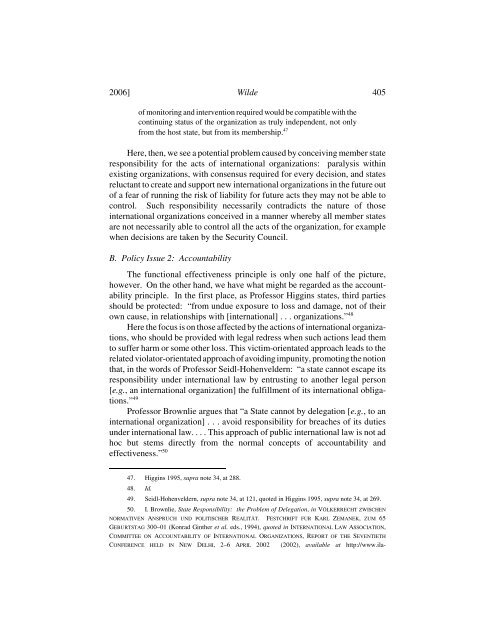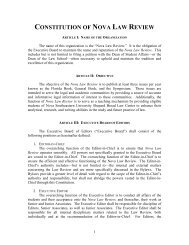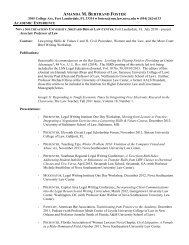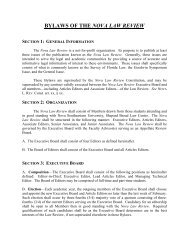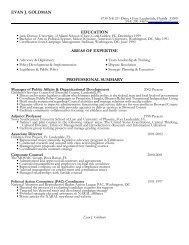Volume 12:2 - Shepard Broad Law Center - Nova Southeastern ...
Volume 12:2 - Shepard Broad Law Center - Nova Southeastern ...
Volume 12:2 - Shepard Broad Law Center - Nova Southeastern ...
You also want an ePaper? Increase the reach of your titles
YUMPU automatically turns print PDFs into web optimized ePapers that Google loves.
2006] Wilde 40547. Higgins 1995, supra note 34, at 288.48. Id.49. Seidl-Hohenveldern, supra note 34, at <strong>12</strong>1, quoted in Higgins 1995, supra note 34, at 269.50. I. Brownlie, State Responsibility: the Problem of Delegation, in VÖLKERRECHT ZWISCHENNORMATIVEN ANSPRUCH UND POLITISCHER REALITÄT. FESTCHRIFT FUR KARL ZEMANEK, ZUM 65GEBURTSTAG 300–01 (Konrad Ginther et al. eds., 1994), quoted in INTERNATIONAL LAW ASSOCIATION,COMMITTEE ON ACCOUNTABILITY OF INTERNATIONAL ORGANIZATIONS, REPORT OF THE SEVENTIETHCONFERENCE HELD IN NEW DELHI, 2–6 APRIL 2002 (2002), available at http://www.ilaofmonitoring and intervention required would be compatible with thecontinuing status of the organization as truly independent, not onlyfrom the host state, but from its membership. 47Here, then, we see a potential problem caused by conceiving member stateresponsibility for the acts of international organizations: paralysis withinexisting organizations, with consensus required for every decision, and statesreluctant to create and support new international organizations in the future outof a fear of running the risk of liability for future acts they may not be able tocontrol. Such responsibility necessarily contradicts the nature of thoseinternational organizations conceived in a manner whereby all member statesare not necessarily able to control all the acts of the organization, for examplewhen decisions are taken by the Security Council.B. Policy Issue 2: AccountabilityThe functional effectiveness principle is only one half of the picture,however. On the other hand, we have what might be regarded as the accountabilityprinciple. In the first place, as Professor Higgins states, third partiesshould be protected: “from undue exposure to loss and damage, not of theirown cause, in relationships with [international] . . . organizations.” 48Here the focus is on those affected by the actions of international organizations,who should be provided with legal redress when such actions lead themto suffer harm or some other loss. This victim-orientated approach leads to therelated violator-orientated approach of avoiding impunity, promoting the notionthat, in the words of Professor Seidl-Hohenveldern: “a state cannot escape itsresponsibility under international law by entrusting to another legal person[e.g., an international organization] the fulfillment of its international obligations.”49Professor Brownlie argues that “a State cannot by delegation [e.g., to aninternational organization] . . . avoid responsibility for breaches of its dutiesunder international law. . . . This approach of public international law is not adhoc but stems directly from the normal concepts of accountability andeffectiveness.” 50


